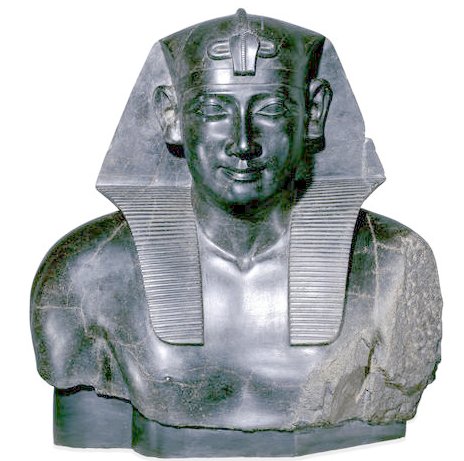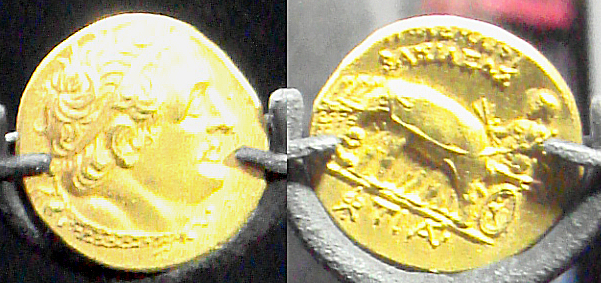- Ptolemy I Soter
:"For the astronomer, see
Ptolemy ; for others named "Ptolemy" or "Ptolemaeus", seePtolemy (disambiguation) ."Infobox Person
name = Ptolemy I Soter
Founder of thePtolemaic Kingdom

image_size = 270px
caption = Bust of Ptolemy Soter in theBritish Museum inLondon
birth_date = 367 BC
birth_place =Macedon
death_date = 283 BC
death_place =Alexandria ,Egypt
education =
occupation =
spouse =Artakama
Thaïs
Euryrdice
Berenice
parents =Lagus andArsinoe of Macedonia
children =Ptolemy II Philadelphus Ptolemy Keraunos
Meleager
ArsinoeLysandra Ptolemais Ptolemy I
Soter (Greek: Polytonic|Πτολεμαῖος Σωτήρ, "Ptolemaĩos Sōtḗr", i.e. Ptolemy the Savior, ca.367 BC—ca.283 BC) was aMacedon ian general underAlexander the Great who became ruler ofEgypt (323 BC—283 BC) and founder of both thePtolemaic Kingdom and thePtolemaic Dynasty . In 305/4 BC he took the title of king.He was the son of
Arsinoe of Macedonia . His father is unknown. He was described in ancient times as the son ofLagus , a Macedonian nobleman, but there are also suggestions that he was illegitimate, and even that he was the son ofPhilip II of Macedon (which would make him the half-brother of Alexander the Great if true). Ptolemy was one ofAlexander the Great 's most trusted generals, and among the seven "somatophylakes", or bodyguards, attached to his person. He was a few years older than Alexander, and his intimate friend since childhood. He may even have been in the group of noble teenagers tutored byAristotle . He was with Alexander from his first campaigns, and played a principal part in the later campaigns inAfghanistan andIndia . At theSusa marriage festival in 324, Alexander had him marry the Persian princessArtakama . Ptolemy also had a consort in Thaïs, the Athenian "hetaera " and one of Alexander's companions in his conquest of the ancient world.uccessor of Alexander
When Alexander died in 323 BC, Ptolemy is said to have instigated the resettlement of the empire made at
Babylon . Through thePartition of Babylon , he was now appointedsatrap ofEgypt , under the nominal kings Philip Arrhidaeus and the infant Alexander IV; the former satrap, the Greek Cleomenes, stayed on as his deputy. Ptolemy quickly moved, without authorization, to subjugateCyrenaica .By custom, kings in Macedonia asserted their right to the throne by burying their predecessor. Probably because he wanted to pre-empt
Perdiccas , the imperial regent, from staking his claim in this way, Ptolemy took great pains in getting his hands on the body of Alexander the Great, placing it temporarily in Memphis. Ptolemy then openly joined the coalition against Perdiccas. Perdiccas appears to have suspected Ptolemy of aiming for the throne himself, and maybe decided that Ptolemy was his most dangerous rival. Ptolemy executed Cleomenes for spying on behalf of Perdiccas — this removed the chief check on his authority, and allowed Ptolemy to obtain the huge sum that Cleomenes had accumulated. [Peter Green, "Alexander to Actium", 1990, pp 13-14]
thumb|250px|A rare coin of Ptolemy I, a reminder of his successful campaigns with Alexander in India.">
Obv: Ptolemy in profile at the beginning of his reign.
Rev: Alexander triumphantly riding a chariot drawn by elephantsIn 321, Perdiccas invaded Egypt. Ptolemy decided to defend the
Nile , and Perdiccas's attempt to force it ended in fiasco, with the loss of 2000 men. This was a fatal blow to Perdiccas' reputation, and he was murdered in his tent by two of his subordinates. Ptolemy immediately crossed the Nile, to provide supplies to what had the day before been an enemy army. Ptolemy was offered the regency in place of Perdiccas; but he declined [Peter Green p14] . Ptolemy was consistent in his policy of securing a power base, while never succumbing to the temptation of risking all to succeed Alexander. [Peter Green pp 119]In the long wars that followed between the different
Diadochi , Ptolemy's first goal was to hold Egypt securely, and his second was to secure control in the outlying areas: Cyrenaica andCyprus , as well as Syria, including the province ofJudea . His first occupation of Syria was in 318, and he established at the same time a protectorate over the petty kings of Cyprus. When Antigonus One-Eye, master of Asia in 315, showed dangerous ambitions, Ptolemy joined the coalition against him, and on the outbreak of war, evacuated Syria. In Cyprus, he fought the partisans of Antigonus, and re-conquered the island (313). A revolt in Cyrene was crushed the same year.
thumb|left|300px
Otherdiadochi Other]In 312, Ptolemy and Seleucus, the fugitive satrap of Babylonia, both invaded Syria, and defeated Demetrius Poliorcetes ("besieger of cities"), the son of Antigonus, in the Battle of Gaza. Again he occupied Syria, and again—after only a few months, when Demetrius had won a battle over his general, and Antigonus entered
Syria in force—he evacuated it. In 311, a peace was concluded between the combatants. Soon after this, the surviving 13-year-old king, Alexander IV, was murdered in Macedonia, leaving the satrap of Egypt absolutely his own master. The peace did not last long, and in 309 Ptolemy personally commanded a fleet that detached the coastal towns of Lycia and Caria from Antigonus, then crossed into Greece, where he took possession of Corinth,Sicyon andMegara (308 BC). In 306, a great fleet under Demetrius attacked Cyprus, and Ptolemy's brother Menelaus was defeated and captured in another decisive Battle of Salamis. Ptolemy's complete loss of Cyprus followed.The satraps Antigonus and Demetrius now each assumed the title of king; Ptolemy, as well as
Cassander ,Lysimachus andSeleucus I Nicator , responded by doing the same. In the winter of 306 BC, Antigonus tried to follow up his victory in Cyprus by invading Egypt; but Ptolemy was strongest there, and successfully held the frontier against him. Ptolemy led no further overseas expeditions against Antigonus. However, he did send great assistance toRhodes when it was besieged by Demetrius (305/304). Pausanius reports that the grateful Rhodians bestowed the name "Soter" ("saviour") upon him as a result of lifting the siege. This account is generally accepted by modern scholars, although the earliest datable mention of it is from coins issued by Ptolemy II in 263 BC.When the coalition against Antigonus was renewed in 302, Ptolemy joined it, and invaded Syria a third time, while Antigonus was engaged with Lysimachus in Asia Minor. On hearing a report that Antigonus had won a decisive victory there, he once again evacuated Syria. But when the news came that Antigonus had been defeated and slain by Lysimachus and Seleucus at the
Battle of Ipsus in 301, he occupied Syria a fourth time.The other members of the coalition had assigned all Syria to Seleucus, after what they regarded as Ptolemy's desertion, and for the next hundred years, the question of the ownership of southern Syria (ie, Judea) produced recurring warfare between the Seleucid and Ptolemaic dynasties. Henceforth, Ptolemy seems to have mingled as little as possible in the rivalries between
Asia Minor andGreece ; he lost what he held in Greece, but reconquered Cyprus in 295/294.Cyrene , after a series of rebellions, was finally subjugated about 300 and placed under his stepson Magas.In 285, Ptolemy made his son by Berenice -
Ptolemy II Philadelphus his co-regent. His eldest (legitimate) son,Ptolemy Ceraunus , whose mother, Eurydice, the daughter of Antipater, had been repudiated, fled to the court of Lysimachus. Ptolemy I Soter died in 283 at the age of 84. Shrewd and cautious, he had a compact and well-ordered realm to show at the end of forty years of war. His reputation for bonhomie and liberality attached the floating soldier-class of Macedonians and Greeks to his service, and was not insignificant; nor did he wholly neglect conciliation of the natives. He was a ready patron of letters, founding the GreatLibrary of Alexandria . He himself wrote a history of Alexander's campaigns that has not survived. This used to be considered an objective work, distinguished by its straightforward honesty and sobriety. However, Ptolemy may have exaggerated his own role, and had propagandist aims in writing his History. Although now lost, it was a principal source for the surviving account byArrian of Nicomedia.Trivia
Ptolemy personally sponsored the great mathematician
Euclid , but found Euclid's seminal work, the Elements, too difficult to study, so he asked if there were an easier way to master it. Euclid famously quipped: "Sire, there is noRoyal Road toGeometry ".ee also
*
Ptolemaic kingdom
*History of Ptolemaic Egypt
*Ptolemais Fiction Portrayals
*Ptolemy was played by Vergilio Teixeira in the film "Alexander the Great" (1956) and by
Robert Earley ,Elliot Cowan , andAnthony Hopkins in theOliver Stone film "Alexander" (2004).*
L. Sprague de Camp 's novel "The Bronze God of Rhodes " features Ptolemy as a minor character. He also appears inHarry Turtledove 's novel "The Gryphon's Skull ".*
Duncan Sprott 's novel "The Ptolemies " features Ptolemy as a central character and founder of the Ptolemaic Dynasty.Jonathan stroud's The Bartimaeus Trilogy
*Ptolemy appears as a character in
Mary Renault 's novels "Fire From Heaven ", "The Persian Boy ", and "Funeral Games ". He also appears in her non-fictional "The Nature of Alexander ".*Ptolemy is one of the minor characters in the historical novel "Roxana Romance" by A.J. Cave with the Hellenic spelling of "Ptolemaios".
Notes
Bibliography
* Walter M. Ellis: Ptolemy of Egypt, London 1993.
* Christian A. Caroli: Ptolemaios I. Soter - Herrscher zweier Kulturen, Konstanz 2007.External links
* [http://penelope.uchicago.edu/Thayer/E/Gazetteer/Places/Africa/Egypt/_Texts/BEVHOP/2*.html Ptolemy Soter I at LacusCurtius] — (Chapter II of E. R Bevan's "House of Ptolemy", 1923)
* [http://www.tyndale.cam.ac.uk/Egypt/ptolemies/ptolemy_i.htm Ptolemy I] (at Egyptian Royal Genealogy, with genealogical table)
* [http://www.livius.org Livius] , [http://www.livius.org/ps-pz/ptolemies/ptolemy_i_soter.htm Ptolemy I Soter] by Jona Lendering
* [http://virtualreligion.net/iho/ptolemy_1.html Ptolemy I Soter] entry in historical sourcebook by Mahlon H. Smith
* [http://freepages.genealogy.rootsweb.com/~jamesdow/s040/f000034.htm A genealogical tree of Ptolemy, though not necessarily reliable]
* [http://www.jerryfielden.com/essays/ptolemy.htm Ptolemy I Soter’s self-promotion in his history of Alexander the Great]
Wikimedia Foundation. 2010.


